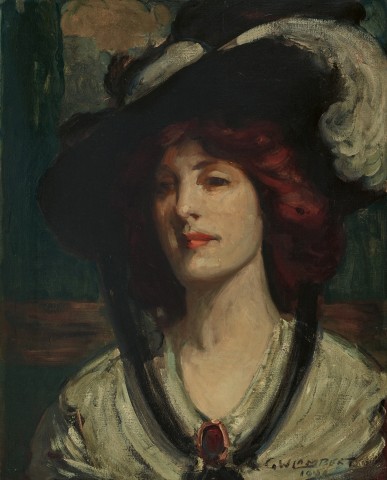PORTRAIT OF THEA PROCTOR, 1905
GEORGE LAMBERT
oil on canvas
51.0 x 41.0 cm
signed and dated lower right: G. W LAMBERT / 1905
Private collection
Theodore Bruce, Adelaide, 30 July 1970
Private collection, Adelaide
Thence by descent
Private collection, Adelaide
Exhibition of Past Australian Painters Lent From Private South Australian Collections, Adelaide Festival of Arts, John Martin & Co. Limited, Adelaide, 8 – 29 March 1974, cat. 67 or 70
George Washington Lambert, S.H Ervin Museum and Art Gallery, The National Trust of Australia, Sydney, 22 August – 8 October 1978, cat. 13
Miss Thea Proctor, 1903, oil on canvas, 90.0 x 69.8 cm, in the collection of the Art Gallery of New South Wales, Sydney
George Lambert and Althea (Thea) Proctor were students together in the late 1890s at the painting academy run by Julian Ashton, later renamed the Sydney Art School. In 1900, Lambert was awarded the inaugural Society of Artists’ Travelling Scholarship and left for England with his wife Amy, whom he had married two days earlier. In 1903, Proctor also arrived in London and to assist her finances, worked part-time as a paid model for Lambert Through this she become an integral component in a sequence of portraits that established her colleague’s European reputation as a painter of note, and Portrait of Thea Proctor, 1905, is a fine example of their collaboration.
Proctor was acknowledged as one of the most stylish Australian women of her time. She combined charm and elegance with a renowned talent for art and design, particularly woodcuts, of which The rose, c.1928, and Women with fans, c.1930, are readily identifiable images from this country’s artistic heritage. In the lead up to leaving for London, Proctor had been engaged for some years to fellow art student Sydney Long, who shared one of the Ashton school’s studios with Lambert. Frustrated by Long’s reticence to commit, she returned the ring and left for overseas. Conversely, her connection to Lambert in London developed well beyond her role as model and she became, above all, his vibrant and intelligent art colleague; a confidant and muse, but not his lover as conjecture has often suggested. In fact, she became an extended member of the artist’s family, ‘a woman with whom Lambert could visit an exhibition while Amy stayed at home and looked after the children, and who in turn was willing to mind the children while he and Amy went to concerts or the theatre.’1 Their first success was the commanding Miss Thea Proctor, 1903, which so impressed the judges at the Royal Academy that it was ‘hung on the line’ at their annual exhibition. Proctor is depicted in this work as both sophisticated and aware, brimming with a forthright confidence that Lambert captured perfectly.
In 1905, he painted Althea, a full-length portrait of Proctor wearing a high-necked black dress and striding across the moors with a greyhound.2 She is shown without a hat but the tilt of the head is identical to the painting on offer here, hinting that Portrait of Thea Proctor may well be a related work, with the main difference being that she is now crowned by a fashionably wide-rimmed and feathered hat, worn at a rakish, suggestive angle. Lambert’s bravura technique as a painter exudes from the frame, with the sweep of the feather carried through by the curves of Proctor’s neckline and the decorative black ribbon attached to the hat. A cameo of rich red and gold sits at her sternum, the colour of which assists to accentuate the sitter’s rich, auburn hair and sensual red lips. There are a number of major works by Lambert featuring Proctor and all but two are now owned by Australian State galleries. Of the latter, the prominent collector Kerry Stokes owns The blue hat, 1909; and Portrait of Thea Proctor, 1905, is the only example remaining in private hands.3
1. Gray, A., George Lambert retrospective: heroes and icons, National Gallery of Australia, Canberra, 2007, p.17
2. Althea was subsequently cut down in size and has been re-titled Portrait of Thea Proctor by the Queensland Art Gallery | Gallery of Modern Art.
3. A final portrait of Proctor, location unknown, is illustrated in Jose, A. and others, The art of George W. Lambert A.R.A, Art in Australia, Sydney, 1924, pl. 46
ANDREW GAYNOR
